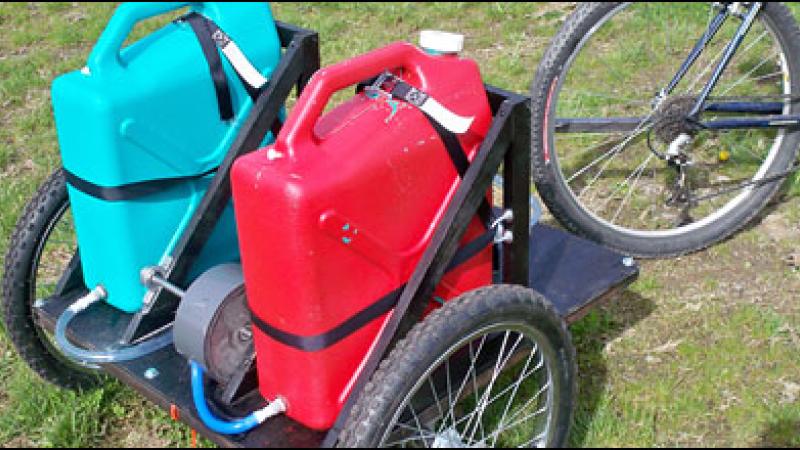Class of ’51 Entrepreneurship Award Supports Innovation in Testing Water for Bacteria, Designing a Portable Water Filtration System, and Creating a Woodchip Heater
March 16, 2012

Student creativity and entrepreneurial thinking for detecting bacteria in water, the development of a portable water filtration system, and a revolutionary approach to designing a low-cost, high-efficiency biomass home heating source have received funding from the Rensselaer Class of ’51 Entrepreneurship Fund. The fund was established to help transform undergraduate and graduate student ideas into successful ventures. The competition is sponsored by the Office of Entrepreneurship at Rensselaer Polytechnic Institute.
One of the most active, generous, and supportive alumni groups at Rensselaer, the Class of ’51 sponsors an annual competition to encourage undergraduate and graduate students to pursue early development of entrepreneurial ideas. A grant of up to $5,000 is awarded each year to a winning individual or teams.
Dripdrop Bacteria Detection
Rensselaer undergraduate students Nathan Pankowsky ’13 and James Davis ’12 earned the top spot and were awarded $2,500 for their innovative technology and entrepreneurial approach to creating a system for quickly and effectively testing water for bacteria such as coliform, fecal coliform, and E.coli.
The Dripdrop system utilizes proprietary software, hardware, and processes to enable farmers and municipal and industrial water treatment facilities to track and test water quality in real-time to avoid the slow, time-consuming, and expensive method of sending samples to a lab and waiting for results. The team hopes that the system will enable users to test continually and respond immediately to changing conditions so that water contamination can be detected and corrected.
Pankowsky and Davis, who are dual majors in mechanical engineering and design, innovation and society, have developed the software, created a prototype system, completed preliminary testing, and researched markets for the system.
Portable Water Filtration System (PWF)
A cross-functional, undergraduate student team earned the second place spot based on their development of a portable trailer and pump system that works in combination to transport and decontaminate water. The system is designed to provide a safe and efficient method for people who are living in developing nations with scarce and distant water supplies, as a way to avoid contaminated water-related illnesses.
Team members include: Nathaniel MacDonald ’13, a mechanical engineering major; Philip Maas ’13, an electrical engineering major; Rosemarie Mastropolo ’13, a biomedical engineering major; Cole George ’13, an electrical engineering major; and Alexander Roumanidakis ’13, an aeronautical engineering major. The team was selected for a $1,500 award toward the further development of their innovation. This team has also evolved their idea through concept, CAD design, engineering drawings, operational prototype, and a user’s manual.
The trailer can be easily attached to any bicycle or pulled by hand. The system is driven by a peristaltic pump that receives its power from a chain and sprocket system that connects the pump shaft to the axle of the trailer. While being transported, source water is pumped through filters from a receiving tank to remove contaminants and travels to a clean water tank for safe use.
The Woodchip Heater
Electrical engineering major Alex Worcester ’12 was awarded third place honors in the competition and a $1,000 prize for his novel approach to small-scale wood chip combustion for home heating. Worcester is working to develop a design that utilizes a renewable, biomass resource in the form of woodchip waste to deliver low operational costs, high efficiency, wide output variability, and infrequent refilling in an environmentally friendly home woodchip heater.
According to Worcester, the heater uses an updraft gasifier approach with four combustion zones, a barrel combustor, and a pyrolysis process and is expected to cost 20 to 30 percent less than a comparably sized wood pellet boiler or furnace. The woodchip fuel is locally available from construction debris, old pallets, and tree trimmings. Chips cost approximately 15 percent less per ton when compared to wood pellets and heating oil is about 12 times more expensive than woodchips. Worcester is preparing to develop a full-scale operational prototype and performance tracking instrumentation.
“This year’s winning ideas demonstrate concepts that the students have been evolving and improving at each step of development,” said Rob Chernow, vice provost for entrepreneurship at Rensselaer and chair of the competition. “They have moved their concepts much closer to the reality of commercialization.”
Chernow also noted that in addition to receiving funding, the winners also receive help from the Entrepreneur Support Committee, which includes faculty, alumni, and resources from the Rensselaer Office of Entrepreneurship and Office of Technology Commercialization. “Our campus resources are invaluable and can provide experienced, knowledgeable guidance to foster further development to help our students move their ideas into the marketplace,” Chernow added.
The annual competition is judged by Chernow, with assistance from a committee of faculty members, graduate students, researchers, and alumni. To qualify for the Class of ’51 Entrepreneurship Fund, entrants must articulate a clear statement of the opportunity and resulting ideas with supporting data; describe how their solution addresses a problem; provide enough details to demonstrate that the solution is feasible and sustainable; and include diagrams and sketches to illustrate their points.
The competition is one of three endowed funds established in 2000 by the Class of ’51, in honor of their 50th Reunion year. “This commitment on the part of the Class of ’51 is an outstanding example of the collective foresight of a dedicated group of alumni and Rensselaer is grateful for their generosity toward future generations of students and faculty,” Chernow said.